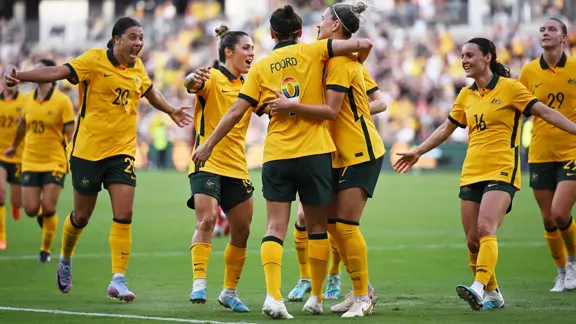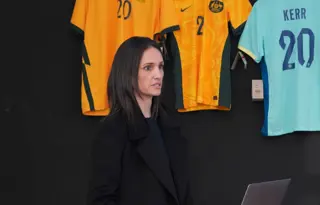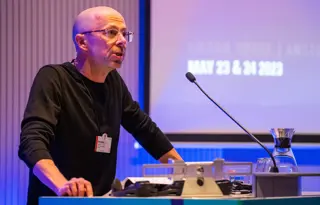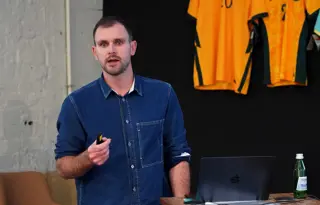News
Professional Footballers Australia: 30 years of serving players

Professional Footballers Australia is celebrating its 30th anniversary. Co-Chief Executive and former national team player Kathryn Gill, who also sits on the FIFPRO board, talks about the union’s history, current status and main challenges.
History
In April 1993, several Australian domestic players gathered with lawyer Brendan Schwab to talk about improving the conditions for professional footballers in Australia. “This led to the establishment of our organisation, which was then called the Australian Soccer Players’ Association,” Gill told FIFPRO.
The key objectives of the new organisation were to support the players and build the game, and the union still acts accordingly. “We are the oldest stakeholder in Australian soccer. The PFA has been the one constant for the players. And we'll continue to be there.”

Gill continued: “We've always prided ourselves on being ahead of reform, being a knowledgeable organisation and ensuring the players’ livelihoods as professionals are at the centre of everything we do.
“At our core, we're an industrial organisation focused on labour reform and, with that, a constant reminder to other football stakeholders that the players are one of – if not the most – important actors in the industry. Our job is to hold those stakeholders to account and demand better of them, to advance the game. The players have always been about what's best for the game.”
Gill uses the establishment of the A-League in 2004 to illustrate the role of the PFA. The previous league, the NSL, was defunct and the PFA took a leading role in reform. "The PFA invested the players' money to undertake extensive research to understand the core tenants a new league would need to thrive."
Gill emphasised the role of Schwab, who took on various positions within the organisation, including chief executive and chairman, and also served on the FIFPRO global board and as chairman of FIFPRO Division Asia.
“The PFA wouldn't be here without Brendan,” said Gill. “Alongside the players, he was the architect of what the organisation should represent and stand for. Brendan was always thinking two steps ahead and understood the power of solidarity. One example was his foresight to bring peak Australian sports unions together by establishing the Australian Athletes Alliance to enable a knowledge sharing of policy advocacy, something he continued doing at World Players Association.”

Main accomplishments
The PFA played an integral part in changing the football landscape in Australia, including creating a standard player contract, the abolition of the domestic transfer system, collective bargaining agreements for men’s and women’s players, and establishing a player development program.
Gill highlights three core achievements:
- The importance the PFA has always put on diversity and equality: “We were the first organisation to establish an equal opportunity code, which was a progressive step at the time. Our former chair (and former FIFPRO board member) Francis Awaritefe led this reform.”
- Collective bargaining agreements arranged for the national teams: “The pay equity deal for our national team members, especially for the Matildas, was ahead of its time. It's pleasing to see that this momentum has continued globally, with other national teams and unions drawing on the structure we put in place to achieve the same goal.”
- The appointment of Gill and Beau Busch in 2020 as Co-Chief Executives. “Beau and I have different but complimentary qualities. We are both values-led and passionate about what we do. Most importantly, we've got credibility and trust amongst the players, which you need as a union leader. It's hard to continue doing your job when you're detached from the membership. We share responsibility across the player groups. We are very conscious about being visible to our male and female members. We will both speak when we go out and present to the players. I will talk on men's football issues, and Beau will speak on women's issues. We don't want to be seen as Beau representing the men's players and me, the women's players.”

Challenges
The PFA has around 700 members, almost equally divided over men’s and women’s players. A fair share of players are under contract with a club abroad, leading to the PFA having a dedicated person that looks after them and keeps them up-to-date about membership matters.
In Australia, though, football is not the most popular sport – Australian Rules Football is. “It controls all the commercial dollars and airtime.” Rugby and cricket are also very popular, increasing the challenge for football and, thus, for the union. “Football is fighting and scrapping for commercial dollars and relevance. We need to work hard to be relevant.”
As resources are limited, the player union wants to be involved in the decision-making process. “Football doesn't have the luxury to keep making poor decisions. We want the best for the players, so we have to use whatever influence we have to guide people to make the decisions that we feel are best for the game.”
Gill refers to the example of the women’s league: the A-League Women. “For a long time, the federation (FA) ran the competition on limited resources. There was no concern for the players, no remuneration, and working conditions were poor. As a result, we were losing talent because they physically and financially couldn't afford to be involved in the competition.
“We asked ourselves what environment needed to be created to ensure that we are producing talented players who can represent our national team, or have meaningful careers in our domestic competition?
“We took the players and the league on a journey. The players indicated that they needed a minimum wage, the league to be visible, and a balanced competition to ensure that the players had enough match minutes to keep developing.”
The PFA’s approach – using the players’ voice to advance the game – worked: “Minimum wages kept growing, the conditions have kept improving, and the breadth of the competition has kept developing, which is a fantastic result. It is a great example of players providing solutions.”
